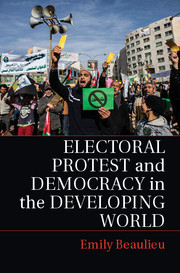Book contents
- Frontmatter
- Dedication
- Contents
- Tables and Figures
- Acknowledgments
- 1 Introduction
- 2 Elite Bargaining and Elections in the Developing World
- 3 Causes of Electoral Protest
- 4 Election Day and Its Aftermath
- 5 Democratic Consequences of Electoral Protest
- 6 Conclusion
- Appendix A Data Description and Robustness Checks
- Appendix B. Boycotts
- Appendix C. Post-Election Mass Demonstrations
- Appendix D. Election-Related Reforms
- References
- Index
6 - Conclusion
Published online by Cambridge University Press: 05 June 2014
- Frontmatter
- Dedication
- Contents
- Tables and Figures
- Acknowledgments
- 1 Introduction
- 2 Elite Bargaining and Elections in the Developing World
- 3 Causes of Electoral Protest
- 4 Election Day and Its Aftermath
- 5 Democratic Consequences of Electoral Protest
- 6 Conclusion
- Appendix A Data Description and Robustness Checks
- Appendix B. Boycotts
- Appendix C. Post-Election Mass Demonstrations
- Appendix D. Election-Related Reforms
- References
- Index
Summary
A glance back at some of the cases in each chapter shows the various trajectories of countries experiencing electoral protest. From its history of electoral protest, international involvement, and incumbent response, Haiti appears to be making incremental progress toward democracy; the dynamics surrounding electoral protest in Cote d’Ivoire and Bangladesh seem to have produced chronic instability in the case of the former and more stable, arguably more democratic, political competition in the case of the latter; and electoral protest in Cameroon seems only to have led to authoritarian retrenchment. Consistent with my statistical analysis, then, these cases show how major election boycotts produce the clearest consequences for democracy – whether these consequences are positive or negative is contingent on the sources of support the boycott receives. In this way, then, boycotts are high-risk protest undertakings: They may push the incumbent to engage in democratic reforms or more authoritarian “reforms,” depending on forces such as domestic or international support that are largely outside of the opposition's control.
The case of Guyana presented in Chapter 2 illustrates both the book's key theoretical dynamics and the indeterminate character of the consequences of post-election demonstrations for democracy. Although Guyanese electoral politics have continued to be contentious, recent incremental improvements have been made. The PPP's domination shows signs of erosion; even though the 2011 election was the fifth in which the PPP secured more parliamentary seats than any other party, the party is currently heading a minority government, with the PNC in the Partnership for National Unity (controlling 26 of the 65 seats in the legislature) and the Alliance for Change (controlling another 7 seats) constituting a majority opposition.
- Type
- Chapter
- Information
- Electoral Protest and Democracy in the Developing World , pp. 126 - 136Publisher: Cambridge University PressPrint publication year: 2014



